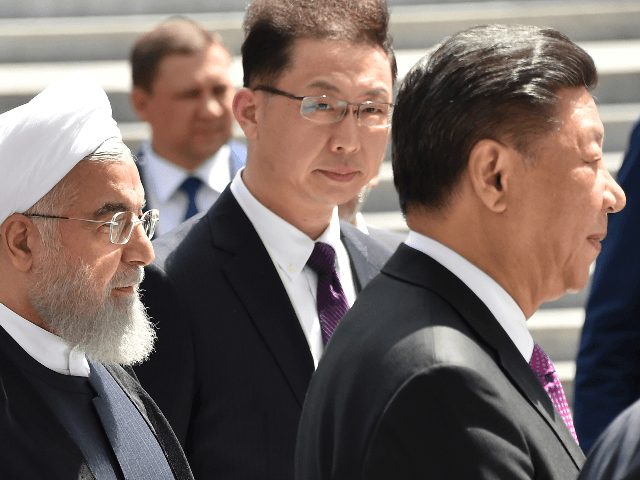Iran over the weekend adopted a policy to allow the entry of Chinese nationals into the Islamic Republic without visas in a bid to boost travel and tourism as punishing U.S. sanctions take a heavy toll on the Shiite country’s economy.
The state-run Press TV outlet in Iran acknowledged that the visa waiver for Chinese nationals is linked to Iran’s decision this month to refrain from stamping the passports of foreign tourists entering the Islamic Republic to help Tehran withstand the U.S. sanctions’ negative impact on the country’s tourism sector.
Press TV reported over the weekend:
The official IRNA [Islamic Republic News Agency] said on Sunday that the Cabinet of President Hassan Rouhani had authorized the Foreign Ministry in a meeting earlier in the day to set up regulations for waving visa requirements for the entry of the Chinese nationals into the Islamic Republic of Iran.
The decision came in response to a joint request by the Foreign Ministry and the Cultural Heritage, Handicrafts and Tourism Organization of Iran (ICHTO), said the IRNA.
Ali Asqar Mounessan, the ICHTO chief, said the move is expected to enhance the Islamic Republic’s ability to attract Chinese tourists into the U.S. sanctions-ravaged country as part of efforts to generate revenue from the tourism sector.
“Our target is to use the vast potentials and attractions in our country to host two million Chinese tourists each year,” Mounessan declared when announcing the proposal over the weekend.
Press TV pointed out that Iranians still require a visa to enter China, adding that, since 2014, both countries have been working on plans to waive visa requirements reciprocally.
“Prior to the Sunday announcement, the Chinese needed to obtain visa upon their arrival in Iran,” Press TV noted.
On Monday, the state-run Mehr News Agency quoted Ebrahim Pourfaraj, the chairman of the Iran Tour Operators Association, as echoing Iran’s tourism chief about the potential boost to the economy stemming from the visa waiver.
Pourfaraj reportedly indicated:
[The] visa waiver is psychologically positive and motivates tourist to travel to the country without any problem for obtaining visa documents at the border or airport; therefore travel to that country will be facilitated. Now, financially, tourists do not pay for visas, and this will … create motivations for tourists to travel Iran, he added.
Citing IRNA, the Agence France-Presse (AFP) news agency noted on Monday that an estimated 52,000 Chinese tourists traveled to Iran during the 12 months ending in March.
Referring to Iran’s tourism chief, Mounessan, AFP added:
He said the [tourism] sector is “unsanctionable” and could help offset the economic hardships caused by tough sanctions Washington reinstated after withdrawing from a multilateral nuclear deal last year. The sanctions have particularly targeted Iran’s vital oil exports and international financial transactions, and were a major factor in the country’s ongoing recession.
Although the U.S. sanctions have not directly targeted Iran’s tourism sector, the country’s aviation industry has taken a hit.
U.S. President Donald Trump’s maximum pressure campaign against Iran, namely the unprecedented wave of economic sanctions on the Shiite powerhouse’s energy, banking, shipping, and aviation sectors, among others, has triggered a raging economic crisis.
Trump’s economic restrictions have harmed Iran’s tourism industry after it experienced a boom following the signing of the 2015 controversial nuclear pact between U.S.-led world powers and Tehran.
Arguing that the deal was not tough enough on Iran, President Trump pulled the United States out of the nuclear agreement, reimposing sanctions suspended under the accord. The sanctions, coupled with Iran’s decision to shoot down an American drone last month have exacerbated tensions between Washington and Tehran, bringing the two countries closer to a military conflict.
In February 2018, the U.S. military warned against American rival China pursuing closer cooperation with Iran, noting that Beijing is attempting to enhance its military posture in the Middle East. The U.S. military noted that the nuclear deal had allowed China to strengthen its relationship with Iran. China is Iran’s top crude oil customer. China is expected to remain defiant of U.S. sanctions.
This year, the Trump administration ended sanction waivers for eight major importers of Iranian oil, including American rival China and U.S. ally India.
Brian Hook, the U.S. special representative to Iran, has said in recent days that the Trump sanctions are “working,” noting that the restrictions have hindered the Islamic Republic’s ability to boost its military capabilities and fund its terror proxies.
Hook told reporters in London last week, “We will intensify sanctions on Iran until it decides to be a normal state.”
“We are on track to deny Iran $50 billion in oil revenue alone,” he added, acknowledging that “Iran does have a history of using front companies to evade sanctions and enrich the regime and fund its foreign adventurism.”
“Even with very little revenue,” U.S.-designated state sponsor of terrorism Iran still possesses asymmetric capabilities that constitute a threat, Hook told lawmakers last month.
Beijing’s ambitious Belt and Road Initiative (BRI), which seeks to connect China to Europe and the Western Hemisphere through a massive infrastructure and technology efforts, is expected to run through Iran. The BRI is known to attract many Chinese workers to its host countries. The U.S. considers BRI a threat.

COMMENTS
Please let us know if you're having issues with commenting.